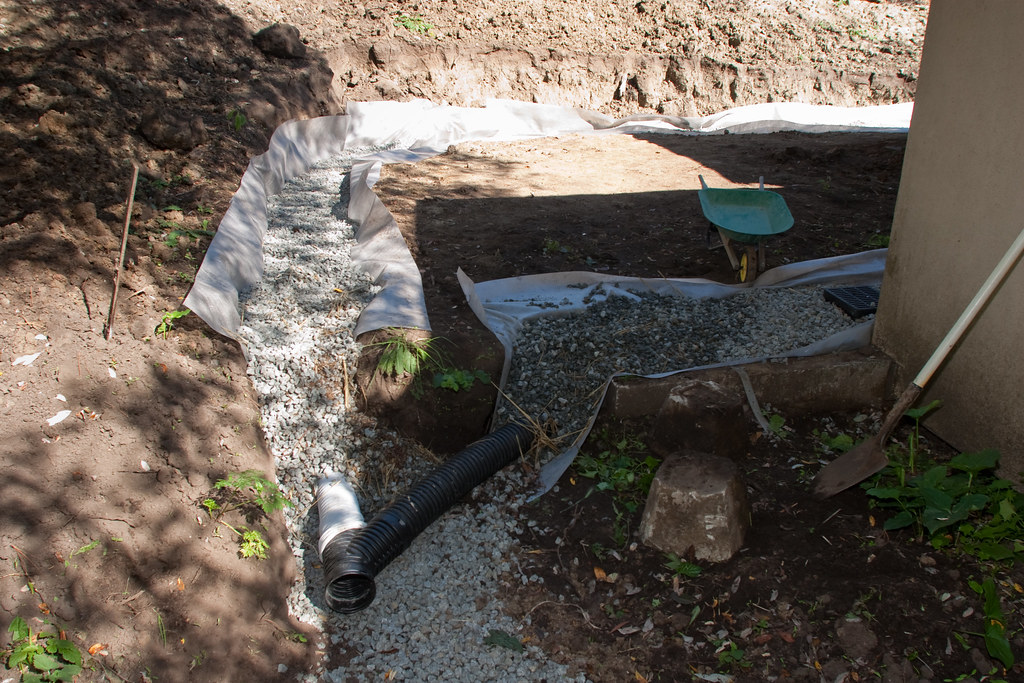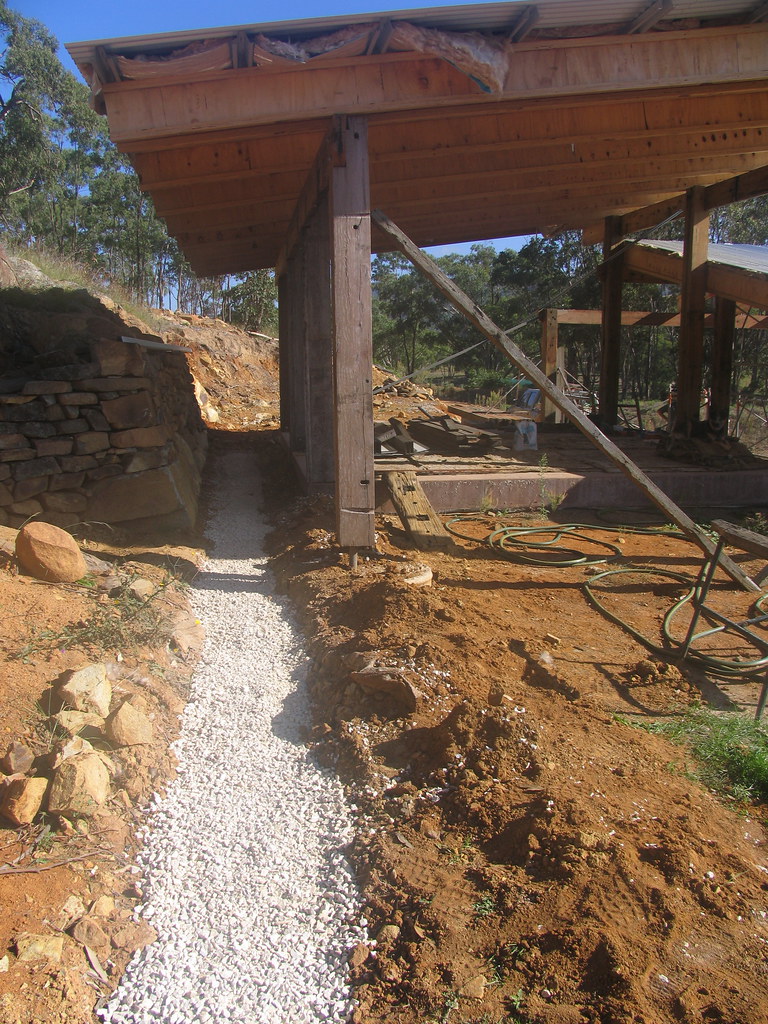French Drain Installation Servicesin Auburn Hills MI
French Drains Installed to Protect Your Property from Water Damage
We Are Locally Owned & Operated For Over 37 Years
Contact Us Today!
We Serve Businesses In And Around The Following Cities:
About French Drain Installation Services
An In-depth Look at French Drain Installation in Auburn Hills
If you own commercial properties in Auburn Hills, you’re likely already aware of the key role drainage systems play in preserving and maintaining the health of these structures. One particularly effective solution is the French Drain—a gravel-filled trench that includes a perforated pipe, designed to redirect surface water and groundwater away from an area. While the name might suggest its origin to be France, this versatile drainage system was actually popularized by an American, Henry French, thus the name ‘French Drain’. This guide will walk you through the process, benefits, and real-world applications of a French Drain installation.
Process of French Drain Installation
French drain installation involves specialized techniques to ensure effective function. The underlying principle, however, is simple: it is a trench filled with gravel or rock, with a strategically placed perforated pipe that redirects water away from an area. For commercial properties, professional french drain installation companies like D&J Contracting are often enlisted to develop and execute a tailored approach, considering factors such as the size of the estate, the slope of the land, and the soil’s percolation rate.
Benefits of French Drain System Installation
A well-installed French Drain system is a smart investment that brings several benefits to commercial properties.
Firstly, it prevents waterlogging and protects your building’s foundation from water damage, thereby enhancing its longevity. If left unchecked, excess water can cause cracks in the structure and catastrophic instability. With their deep-reaching mechanism, French drains offer a comprehensive solution to this problem.
Apart from its practical benefits, a well-executed French Drain installation around your commercial house accentuates its aesthetic appeal. Although primarily functional, with carefully chosen materials and proper landscaping, French drains can seamlessly blend into the surroundings, giving your space an organized, tidy appearance.
Real-world Applications
To illustrate the practical value, consider a commercial property in Auburn Hills, which is at a lower elevation than its surrounding area. This geographical disadvantage often leads to a build-up of water, consequently causing water logging and dampening foundation walls. Installation of a French drain system can effectively navigate water away, thus ensuring the building’s integrity and extending its life span. Businesses like D&J Contracting in Auburn Hills can expertly handle these intricate installations, having honed their craft in a multitude of scenarios.
Investment in French Drain Installation
As for the French drain installation cost, it varies depending on the project scale and property size. If you consider the potential repair and rehabilitation costs of water damage over time, it becomes clear that installing a French drain system is strategic rather than lavish. It’s also worth noting that combining a sump pump with a French drain installation heightens the system’s efficiency, particularly for areas prone to heavy rain or flooding. As always, these are best installed by experienced professionals like those at D&J Contracting.
In summary, commercial properties in Auburn Hills will genuinely benefit from installing French drain systems. Given their versatility and efficacy, these systems can ensure the preservation of a property’s physical integrity and by extension, its value. Although the initial cost may seem considerable, if you equate it with the potential cost of water damage to the property in the long run, it’s well worth the investment.
So, why wait for a water damage crisis when you can prevent it in the first place? Don’t hesitate to contact experts like D&J Contracting. With their vast experience and sound knowledge, they can provide the most suitable and cost-effective solutions for your needs.
French Drain Installation Services Gallery


Call Us Today to receive your Free Quote for
French Drain Installation in Auburn Hills
Serving: Auburn Hills, Michigan

About Auburn Hills, Michigan
In 1908, automobile pioneer John Dodge bought a farmhouse 3 miles (4.8 km) northeast of Auburn Heights to use as his country retreat. His oldest child, Winifred Dodge, married real estate baron Wesson Seyburn, who built his own country retreat 2.5 miles (4.0 km) north of Auburn Heights. The estate included hunting land, dog kennels, a swimming pool, horse stables, and a 5,000-square-foot (460 m) Colonial Revival house. Pontiac Township purchased the estate in 1976, and adapted the buildings for government use. Today, it is known as the Auburn Hills Civic Center.
The first use of the name “Auburn Hills,” in 1964, was by Oakland Community College. They named their campus (a former Nike missile base) at Featherstone and Squirrel roads for the town and the hilly terrain in the area. Besides Oakland Community College, three other colleges, Oakland University, Baker College, and Western Michigan University Thomas M. Cooley Law School have campuses partially within the city limits.
Auburn Hills began as Pontiac Township, including the village of Auburn, in 1821, at what is today the corner of Auburn and Squirrel roads. Situated on the Clinton River, it was named by Aaron Webster, the first settler, for Auburn, New York. His sawmill and grist mill attracted settlers to Auburn. After the streets were laid out in 1826, Auburn rivaled nearby Pontiac until the 1860s, when it lost its own prosperity. The town was renamed Amy in 1880, and it officially became Auburn Heights in 1919. Pontiac Township bordered the city of Pontiac on two sides. The township attempted to incorporate as Pontiac Heights in 1971, but was denied by state officials. Pontiac Township became a charter township in 1978, to protect itself from further annexation. In 1983, Pontiac Township merged with the village of Auburn Heights to become the City of Auburn Hills. It is not to be confused with the similarly named city of Auburn, Michigan, that exists in Bay County, near Saginaw Bay.
According to the United States Census Bureau, the city has a total area of 16.64 square miles (43.10 km), of which 16.60 square miles (42.99 km) is land and 0.04 square miles (0.10 km) (0.24%) is water.
| Census | Pop. | Note | %± |
|---|---|---|---|
| 1880 | 111 | — | |
| 1990 | 17,076 | — | |
| 2000 | 19,837 | 16.2% | |
| 2010 | 21,412 | 7.9% | |
| 2020 | 24,360 | 13.8% | |
| U.S. Decennial Census | |||
As of the census of 2010, there were 21,412 people, 8,844 households, and 4,923 families living in the city. The population density was 1,289.9 inhabitants per square mile (498.0/km). There were 9,965 housing units at an average density of 600.3 per square mile (231.8/km). The racial makeup of the city was 66.3% White, 18.5% African American, 0.3% Native American, 8.9% Asian, 2.7% from other races, and 3.4% from two or more races. Hispanic or Latino of any race were 7.8% of the population.
There were 8,844 households, of which 27.0% had children under the age of 18 living with them, 38.8% were married couples living together, 12.4% had a female householder with no husband present, 4.5% had a male householder with no wife present, and 44.3% were non-families. 33.5% of all households were made up of individuals, and 7.3% had someone living alone who was 65 years of age or older. The average household size was 2.24 and the average family size was 2.90.
The median age in the city was 31.4 years. 19.4% of residents were under the age of 18; 17.8% were between the ages of 18 and 24; 31.9% were from 25 to 44; 21.6% were from 45 to 64; and 9.4% were 65 years of age or older. The gender makeup of the city was 48.4% female and 51.6% male.
As of the census of 2000, there were 19,837 people, 8,064 households, and 4,604 families living in the city. The population density was 1,194.5 inhabitants per square mile (461.2/km). There were 8,822 housing units at an average density of 531.2 per square mile (205.1/km). The racial makeup of the city was 75.92% White, 13.22% African American, 0.32% Native American, 6.33% Asian, 0.04% Pacific Islander, 1.56% from other races, and 2.61% from two or more races. Hispanic or Latino of any race were 4.50% of the population.
There were 8,064 households, out of which 26.7% had children under the age of 18 living with them; 43.0% were married couples living together; 10.5% had a female householder with no husband present and 42.9% were non-families. 33.1% of all households were made up of individuals, and 6.0% had someone living alone who was 65 years of age or older. The average household size was 2.25 and the average family size was 2.92.
The age distribution is 20.4% under the age of 18, 15.9% from 18 to 24, 38.1% from 25 to 44, 18.2% from 45 to 64, and 7.3% who were 65 years of age or older. The median age was 31 years. For every 100 females, there were 98.3 males. For every 100 females age 18 and over, there were 97.5 males.
The median income for a household in the city was $51,376, and the median income for a family was $60,849. Males had a median income of $45,686 versus $34,015 for females. The per capita income for the city was $25,529. About 3.9% of families and 6.3% of the population were below the poverty line, including 6.4% of those under age 18 and 4.4% of those age 66 or over.
School districts serving sections of Auburn Hills include Avondale School District, Pontiac School District, and Rochester Community Schools.
The Avondale School District operates two elementary schools in the city limits: R. Grant Graham Elementary School and Auburn Elementary School. Portions of Auburn Hills in ASD are zoned to these schools. All ASD residents are zoned to Avondale Middle School in Rochester Hills and Avondale High School in Auburn Hills. Other ASD facilities in Auburn Hills include the district administrative offices and Avondale Montessori. A Pontiac school district school, Will Rogers Elementary School, is located in northeastern Auburn Hills.
Private schools in Auburn Hills include:
- Auburn Hills Christian School
- Oakland Christian School
Private schools near Auburn Hills:
- Notre Dame Preparatory/Marist Academy, Pontiac
- Holy Family Regional School (HFRS) – Consists of a grade PK-3 North Campus in Rochester and a 4-8 South Campus in Rochester Hills. Two churches in Auburn Hills designate HFRS as the parish school: St. John Fisher Chapel and Sacred Heart of the Hills. The first two sponsored the school from the beginning and the other three joined later, with Sacred Heart being the final one.
The main campus of Oakland University sits within Auburn Hills. Oakland Community College, Baker College, and Western Michigan University Thomas M. Cooley Law School are also situated in Auburn Hills.
Call Us Today to receive your Free Quote for
French Drain Installation in Auburn Hills
Related Services in Auburn Hills, Michigan
We Serve Businesses In The Following Zip Codes:
48007, 48015, 48021, 48026, 48035, 48036, 48038, 48042, 48043, 48044, 48045, 48046, 48047, 48048, 48050, 48051, 48066, 48071, 48080, 48081, 48082, 48083, 48084, 48085, 48088, 48089, 48090, 48091, 48092, 48093, 48098, 48099, 48225, 48230, 48236, 48310, 48311, 48312, 48313, 48314, 48315, 48316, 48317, 48318, 48397